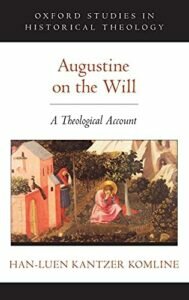Professor Kantzer Komline’s book covers much the same territory as studies of Augustine’s doctrine of grace, except that the focus is not on how the concept of will figures in the doctrine of grace but on how the doctrine of grace affects the concept of will. Either way, the overall story of Augustine’s development is largely the same, and there is a great deal to learn about it from this book. However, there are longstanding disagreements about points of detail that are worth revisiting here.
Consider three texts that can be taken as milestones along the path to Augustine’s mature view of grace, all of which Kantzer Komline discusses:
(1) To Simplicianus, book 1, question 2 (especially §§12–13 and 21–22), written in 396, well before the Pelagian controversy;
(2) On the Spirit and the Letter (especially 34.60), written against the Pelagians near the beginning of the controversy in 412;
(3) On the Grace of Christ (the first book of On the Grace of Christ and Original Sin, especially 13.14–14.15), written in 418, inaugurating a new and more mature phase of Augustine’s anti-Pelagian writing.Her main discussion of To Simplicianus is in pp. 94–107; On the Spirit and the Letter in pp. 139–41,181–82; On the Grace of Christ in pp. 144–45, 183–84, 189–90, and 195–98.
These texts discuss the origination of faith (what is called the initium fidei in the very late treatise On the Predestination of the Saints, written in 428), which is a crucial issue because Augustine identifies the choice to believe as the first point at which the fallen will becomes a good will. Christian faith is the first step of the good will, whose next step is to seek through faithful prayer the gift of grace, by which the good will is strengthened to accomplish the good it wills, through an inward gift of love and delight in righteousness that is poured out into our hearts by the Holy Spirit (Rom 5:5).
Grace is prevenient (coming before—prae-venire—any moral goodness in our will) to the extent that it comes to believers not only in response to their prayers of faith but also prior to their believing and praying, so that faith itself is entirely a gift of God. Two questions about the prevenience of grace bring the differences as well as the continuities between these three texts into focus:
(a) The crucial logical question is whether prevenient grace is a sufficient as well as necessary condition of our coming to faith. Is grace merely necessary, such that without it there is no coming to faith? Or is grace more far-reaching, being sufficient by itself to make sure that we come to faith? The sufficiency of grace, when Augustine affirms it, means that when God chooses (i.e., elects) to give people the gift of faith they unfailingly choose to accept it and thus come willingly to the faith of Christ.
(b) The crucial causal question is how grace acts on our will when the gift of faith is given. Faith always involves the free assent or consent of the will, in Augustine’s view. So does God merely call us to faith, for example through the preaching of the gospel, so that our will responds by giving its consent to the truth of the calling? Or does God also work inwardly in our hearts so as to move, incline, or turn the will itself, causing us to choose freely to give our consent?
The crucial logical question is whether prevenient grace is a sufficient as well as necessary condition of our coming to faith.
These two questions need to be distinguished because the logical sufficiency of grace is not the same concept as the causal power of grace, even though the latter may serve to explain why the former is true.
The key point of continuity, which Augustine himself noted, is that in To Simplicianus, well before the outbreak of the Pelagian controversy, he gives a clear answer to the logical question.Retractations 2:1.1, which Augustine himself quotes and expands upon in On the Predestination of the Saints 4.8. He argues that God’s election is sufficient, such that when God chooses to give people the gift of faith, they unfailingly receive it. This answer to the logical question is the same that Augustine gives in the mature phase of his anti-Pelagian writing, beginning with texts such as On the Grace of Christ in 418. Oddly, however, he does not give this answer in the initial stage of the controversy in 412. In fact, he avoids answering the question, even after raising it in On the Spirit and the Letter 34.60, as J. Patout Burns points out.J. Patout Burns, The Development of Augustine’s Doctrine of Operative Grace (Paris: Études Augustiniennes, 1980), 127–31. Burns also has in-depth discussions of the other two texts in pp. 37–44, 142–45. I examine these texts in Inner Grace: Augustine in the Traditions of Plato and Paul (Oxford: Oxford University Press, 2008) 50–62, 82–87, 93–97. In this text, Augustine emphasizes the necessity of God’s calling, without which there is no coming to faith, and he even raises the question of why some people but not others are persuaded by the call—but then leaves the answer to that question a mystery.
It was Burns’s magisterial account of the development of Augustine’s doctrine of grace that led me to seek an explanation for Augustine’s evasiveness on this point. This is where the causal question becomes crucial. According to To Simplicianus 1:2.13, the means by which God gives the gift of faith is a calling, such as the preaching of the gospel. Augustine speaks of people being called in a way that fits (congruenter vocati), which is apt or suitable to them (aptum).Kantzer Komline sometimes uses Burns’s term for this, “congruous vocation,” or translates it “congruent calling” (p. 104). But she also quotes the misleading translation by J.H.S. Burleigh in Augustine: Earlier Writings (Philadelphia, PA: Westminster, 1953), which uses the much later Calvinist language of being “effectually” called (Kantzer Komline, p. 100). Kantzer Komline uses Burns’s term for this, “congruous vocation.” There are other kinds of vocation or calling, for (as Augustine quotes) “many are called but few are chosen” (Matt 22:14). The call to faith often falls on deaf ears. But when God chooses to convert people to the faith, he makes sure that the calling that comes to them is suitable, in such a way that it unfailingly elicits their free consent, indeed their delight (To Simplicianus 1:2.21). God is, as it were, an infallible rhetorician who, knowing the thoughts of every heart, can say exactly the right thing to persuade his hearers to believe what he says. Those who are called but not chosen, by contrast, are those to whom he does not choose to speak in this unfailingly persuasive way. He leaves their wicked wills unchanged, so that they end up meriting eternal condemnation. Thus the mature Augustinian doctrine of election is already in place before the Pelagian controversy begins, but it is not tied to an account of the inner working of the Holy Spirit or God inwardly moving the human will. The answer to the logical question is the same but the answer to the causal question is different.
And yet Augustine refuses to answer the logical question in On the Spirit and the Letter. There is an explanation for this, I think. The new challenge of the Pelagian controversy has made his earlier answer to the causal question untenable. An external calling, including any preaching or teaching in human words, is precisely the sort of thing Pelagius is willing to call by the name “grace,” for it only becomes effective when we accept it by our own free will. Thus it is possible for Pelagians to pay lip service to divine grace while still claiming that their own will is the decisive power of salvation. The only way to counter this Pelagian error (Augustine evidently realizes as the controversy unfolds) is to see the free consent that the will gives to the divine calling as itself a work of God deep within the soul. Thus in On the Grace of Christ 13.14, Augustine speaks of a special inward mode of divine teaching that results not just in our knowing what to do but in our willing and doing it. It is teaching that God “pours out with an ineffable sweetness in the depths and interior of the soul,” granting not just understanding to the mind but delight to the will, so that we not only can come to Christ in faith but actually do come. In explaining this uniquely divine mode of teaching, Augustine draws on the concept of God as inner teacher that he had developed in his early treatise On the Teacher in 389.See especially On the Teacher 11:38, where the inner teacher is Christ, operating inwardly as the Power and eternal Wisdom of God (1 Cor 1:24). Nearly three decades later, Augustinian inwardness is now expanded in a new way, as the power of the inner teacher causes not just the intellect to see the immutable Truth but the will to choose the true faith. Prevenient grace is sufficient because God inwardly moves the will.
Augustine speaks of a special inward mode of divine teaching that results not just in our knowing what to do but in our willing and doing it.
Thus to secure the answer to the logical question that he gave in To Simplicianus, Augustine gives a new and more robust answer to the causal question, which he was not yet ready to do in On the Spirit and the Letter. Kantzer Komline uses traditional labels for this robust answer: irresistible grace and interior operation. The latter alludes both to the inwardness of grace and to Augustine’s use of Philippians 2:13, “It is God who works [operatur] in you both to will and to accomplish for good will [pro bona voluntate].”I’m translating from the Latin text used by Augustine. Many translators of Augustine have a bad habit of plugging in standard Bible translations, such as the RSV’s “God is at work in you, both to will and to work for his good pleasure,” rather than translating the Latin text of Phil 2:13 that Augustine is actually discussing, which allows him to say God’s work or operation is not just for God’s good pleasure but for our good will. It is an appropriate label for Augustine’s mature anti-Pelagian doctrine of grace, but not for To Simplicianus (contra Kantzer Komline, p. 195 n. 79). The label “irresistible grace,” on the other hand, imports a later concept that is foreign to Augustine’s thinking altogether, which never involves the will resisting grace, precisely because when grace does operate inwardly it is not an outside force (contra Kantzer Komline, p. 100) nor a form of coercion to resist. Inner grace is a source of delight that frees the will by turning it in the direction of its true happiness, converting it to faith so that it is no longer unwilling but willing, thus giving it the ability to will and accomplish the good for which it was created. One does not resist being freed to enjoy one’s inmost delight. It does not even make logical sense to talk that way, which is why both labels, “irresistible” and “resistible,” are out of place in Augustine’s doctrine of grace.
One does not resist being freed to enjoy one’s inmost delight.
Likewise Augustine, in contrast to his translators, does not speak of a “power” to disobey God.The translations Kantzer Komline uses speak of someone having it “in the power in his will not to obey” in To Simplicianus 1:2.13 (Kantzer Komline, p. 100), and “in the power of one’s will” to consent or dissent from the calling in On the Spirit and the Letter (Kantzer Komline, p. 142), though in the Latin neither of these passages uses language for power or ability; they speak merely of what is “in the will.” Power is, for Augustine as for most ancient thinkers, a teleological term, meaning an ability to accomplish some good. Hence in Augustine’s view, evils such as sin and unbelief do not derive from a power, ability, or freedom in the will, but from the possibility of failure, defect, and bondage. It is what happens when we are morally diseased or wounded or enslaved, going astray, ignorant of our own good and missing our true happiness.For Augustine, evil is always a failure or defect, having power and being only because of the good it corrupts. See my chapter, “Augustine on Evil,” in the Routledge Handbook on the Philosophy of Evil, ed. Thomas Nys and Stephen de Wijze (New York: Routledge, 2019), 30–41. Thus in To Simplicianus 1:2.13, those who are called but not chosen do not have a power to resist grace but rather an inability to accept it. They “cannot be moved” by the call (moveri non possent), whereas if they were called in a different, more suitable way, they “might be able” to adjust their will to the faith (possent alio modo vocati accommodare fidei voluntatem). The suitable call does not overcome resistance but bestows an ability that was otherwise lacking.
Hence my disagreement with Kantzer Komline, who (1) sees interior operation in To Simplicianus, where I think it is absent, and (2) sees irresistible grace both there and in Augustine’s later writings against the Pelagians (pp. 100, 144, 149; cf. in slightly different language, pp. 125, 131). The latter view seems to me to confuse the logical sufficiency of grace with the causal irresistibility of grace. The sufficiency of grace is Augustine’s teaching after To Simplicianus, with the exception of On the Spirit and the Letter—an exception that Kantzer Komline notes but does not explain (p. 104 n. 137). The irresistibility of grace, by contrast, is a concept alien to Augustine, as we can see by attending to the causal difference between a merely external calling, which (in Augustine’s view) has no intrinsic power to move the will, and the inward working of the Holy Spirit, which does. This same causal difference helps explain why On the Spirit and the Letter is an exception, as I suggested above.
It is worth keeping in mind the distinctive inwardness of Augustine’s mature doctrine of grace, not just to explain the development of Augustine’s thought, but to understand the legacy he has bequeathed to later Western theology. It helps explain why not just John Calvin but Thomas Aquinas thinks that divine election and the predestination of grace are not incompatible with free will. It is our own sin, not the grace of God, that takes away the inward freedom of the will. The interior operation of grace accomplishes its goal not by overcoming our resistance but by changing us from unwilling to willing—causing us to be willing, indeed delighted, to do God’s will. When inwardly taught by his all-sufficient grace, we come to faith because he causes us to perceive with delight the beauty of the supreme Good and embrace it as our own true good.








Comments
Be the first one to make a comment!